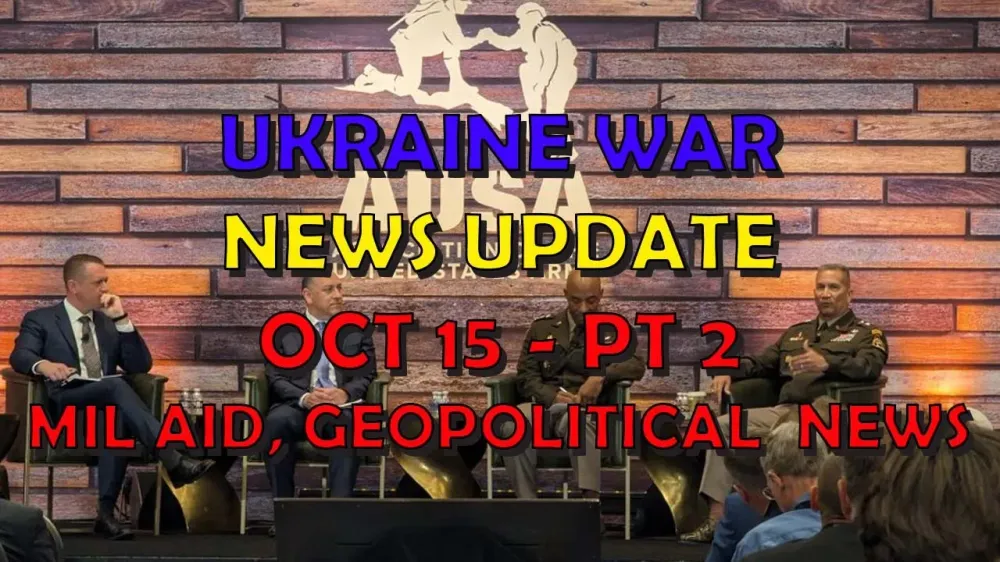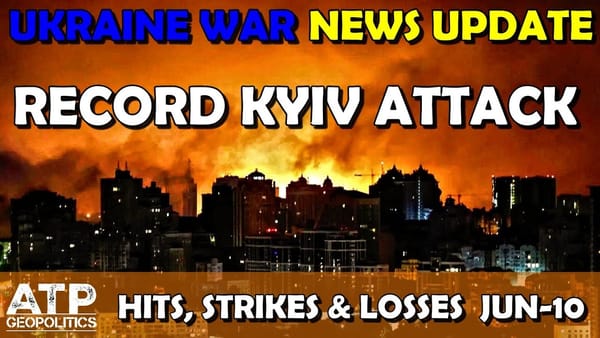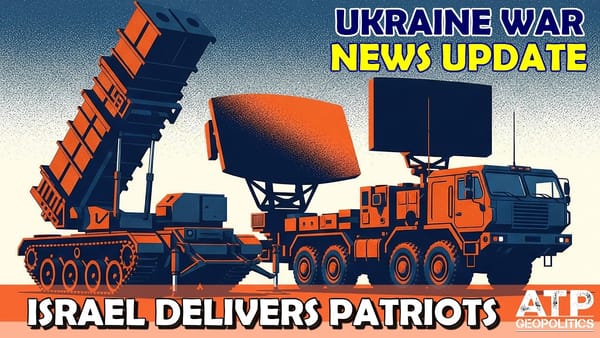Ukraine War Update NEWS: Military Aid & Geopolitical News
Table of Contents 📖
"It's almost like it's the Russian death throes. I don't know if there's a sense of desperation. They're just like, it's all or nothing, we've got to do everything we can uh and force you know we got to do everything we can to get Trump in charge and then force negotiations we get to keep a bunch of Ukraine and then we'll rebuild and come at it again and we'll still have a chance of of creating this this Russian empire this Russky Mir."
Hello Team
🎦 00:00-00:46⏩
Jonathan welcomes viewers to the second Ukraine War Update of the day. He is frustrated by the slow delivery of Patriot systems promised to Ukraine in July, particularly in contrast to the speed with which North Korea, Iran, and China are supplying Russia. Jonathan believes that Ukraine has received the Romanian Patriot system but notes the overall slow response from allies is shameful and infuriating.
Return to top⤴️
EU to extend Ukrainian Military Training Mission
🎦 00:46-03:40⏩
The EU is extending its military training mission in Ukraine for two more years. Jonathan welcomes this and the EU's commitment to invest in Ukraine's defence industry. He questions why the EU is not investing in its own defence industry instead, suggesting that the only logical reasons would be if it were cheaper to produce in Ukraine, Ukraine possessed manufacturing facilities that the EU lacked, or cheaper labour or taxes were available in Ukraine. He is concerned that Europe has not reacted fast enough to Ukraine's needs, viewing the situation as a missed economic stimulus opportunity.
Return to top⤴️
USA 155mm shell production slowdown
🎦 03:40-07:29⏩
Jonathan discusses the US Army's acknowledgement of a slowdown in the planned ramp-up of 155mm artillery shell production. While production has increased from 14,000 to 40,000 shells per month, the target of 70,000 by the end of the year, rising to 80,000, is unlikely to be met. He shares an infographic from Colby Badwais illustrating the plateau in production, suggesting it's related to funding supplementals. Jonathan speculates that the USAI portion of the supplemental could be used for ordering more shells, possibly drawing from existing stocks or the presidential drawdown, with replenishment funded through the supplemental. He also notes a claim, without confirming it, that some 155mm ammunition may be going to Israel, potentially impacting supplies to Ukraine. This is controversial due to the ongoing conflict in Israel. Jonathan also mentions the deployment of a FAD anti-ballistic missile system to Israel, questioning why the US is providing this high-level equipment to Israel while Ukraine's support seems less forthright. He believes that the upcoming US elections and the politically divisive nature of the war might be contributing factors.
Return to top⤴️
Greece highlights M2 Bradley refurbishment costs
🎦 07:29-09:19⏩
The Greek Defence Minister has stated that refurbishing M2 Bradley infantry fighting vehicles, potentially received through the US Excess Defence Articles (EDA) program, could cost up to 8 million euros per vehicle. A Greek delegation visited Camp Shelby in Mississippi to inspect 62 potential Bradleys but found none operational, with refurbishment costs deemed prohibitive. BAE Systems also offered 102 Bradleys to Greece, but these were in a similar state. Jonathan wonders how the condition of these Bradleys affects Ukraine, speculating whether Ukraine might have received more if they had been in better condition and questioning the overall costs involved. He finds it interesting that so many Bradleys are seemingly unusable and wonders what lessons can be learned from Greece's experience.
Return to top⤴️
Ukraine's use of Integrated Air and Missile Defence Battle Command System (IBCS)
🎦 09:19-12:44⏩
Jonathan revisits the topic of the Integrated Air and Missile Defence Battle Command System (IBCS), which integrates radars, missile launchers, and command centres into a centrally controlled network. He previously discussed rumours of a system being sent to Ukraine over a year and a half ago. This was significant as it was a new system for the Americans, potentially the first working version. Colby Badwais has now implicitly confirmed the transfer, reporting that Ukrainian Patriot crews requested a system to integrate their air defence systems, and the US Army provided an IBCS Engagement Operations Centre (EOC) to assist. John Ridge further clarified, stating that the transfer occurred in early 2023, initially disclosed in an April 2023 reprogramming action. Jonathan is fascinated by the role of such systems and anticipates learning more about their effectiveness after the war. He also speculates on Ukraine's reliance on US, French, and British satellite imagery and intelligence, believing this provided a significant advantage, though China might be closing the gap for Russia.
Return to top⤴️
Ukraine deploys 1 million state-funded drones
🎦 12:44-14:17⏩
Ukraine has deployed 1 million state-funded drones to the front line, with plans to increase this number significantly. Zelensky aims to leverage technological advancements, and there are claims that between 3 and 4 million drones could be produced in the next year.
Return to top⤴️
Russia recruiting soldiers from impoverished countries
🎦 14:17-16:46⏩
Russia is recruiting soldiers from impoverished countries, offering them financial incentives to fight in Ukraine. A TikTok story highlighted the plight of a Nepalese mother whose son is either fighting for Russia or is a POW in Ukraine. There are claims of 14-15,000 Nepalese fighters, but Jonathan believes this might be an exaggeration. He notes this recruitment pattern is present in other countries too, including Sri Lanka, India, Cape Verde, and several African nations. He mentions a CBC News report featuring an interview with the mother of one of the Nepali soldiers.
Return to top⤴️
North Korean battalion fighting for Russia in Ukraine
🎦 16:46-17:58⏩
Liga.net, a Ukrainian news source, claims that Russia is forming a battalion of North Korean citizens within the 11th Separate Air Assault Brigade, potentially consisting of 3,000 personnel. This unit could be deployed near Sudzha in the Kursk region. Jonathan believes this is a serious escalation by Russia, crossing a significant red line. He expects a reaction from the West and NATO. He outlines a trajectory of increasing North Korean involvement: supplying 13,000+ cargo containers of artillery ammunition (now making up 50% of Russian artillery ammunition), providing KN-23 ballistic missiles, deploying personnel alongside Russian troops, and now potentially forming a dedicated battalion. He cites a Guardian report mentioning six North Korean officers who died in a strike in Luhansk or Donetsk, indicating their presence in occupied Ukrainian territory. Previous reports from the Washington Post mentioned thousands of North Koreans training in Ukraine, and this new information suggests a specific 3,000-strong battalion.
Return to top⤴️
NATO's response to Russia
🎦 17:58-18:43⏩
Newly appointed NATO Secretary General Mark Rutte has stated that Russia cannot intimidate NATO with threats. He emphasised that NATO will do whatever it takes to ensure Russia does not succeed and that Ukraine will win. Jonathan welcomes this strong rhetoric but acknowledges concerns about Putin's nuclear saber-rattling. He believes this has significantly affected the US response to the war. Jonathan notes that NATO is trying to navigate this situation while preparing for a potential return of Donald Trump, who could shift US policy. The current US administration is influenced by the anti-escalation approach of figures like Jake Sullivan. He speculates on how Kamala Harris might handle the war if she wins the upcoming election, suggesting she could differ from Biden in areas like approving strikes. He mentions Senator Mark Kelly, a former Navy airman and astronaut, who hinted at the possibility of deeper strikes into Russia, but notes this is unlikely to happen before November.
Return to top⤴️
War fatigue in the West
🎦 18:43-20:00⏩
Finland's Foreign Minister, Elina Valtonen, has highlighted growing war fatigue in the West regarding aid and support for Ukraine. Jonathan is disheartened and angered by this, especially coming from a country so close to the conflict and supportive of Ukraine. He expresses frustration that some Western officials are privately discussing a ceasefire despite Russia's occupation of Ukrainian territory. He believes the West could have done more to ensure a quicker Ukrainian victory, which is now uncertain. He thinks a stalemate, with Ukraine losing territory, is the most likely outcome, a situation he finds infuriating as it could have been avoided.
Return to top⤴️
Czechia's purchase of Russian fuel
🎦 20:00-22:26⏩
Czechia, a close ally of Ukraine, has allowed its oil refineries to earn over a billion euros in surplus profits by purchasing discounted Russian fuel, despite alternatives being available. Politico reported on this, citing research from the Centre for the Study of Democracy. Jonathan acknowledges some arguments defending Czechia, suggesting they might be fulfilling existing contracts. He hesitates to judge countries too harshly, recognizing that individuals and companies are motivated by profit and might try to bypass sanctions for financial gain. This explains why many countries continue exporting to Russia indirectly via nations like Kyrgyzstan and Armenia. He acknowledges that some countries might be locked into long-term contracts or fear causing inflation by halting Russian hydrocarbon purchases, decisions often influenced by election cycles. Jonathan praises Germany for weaning itself off Russian hydrocarbons, partly due to the Nord Stream pipeline's closure, demonstrating that it is possible. He notes that Czechia is facing criticism for its actions, particularly given its dependence on Russian oil, which currently stands at 50%. Analysts believe Czechia could completely abandon Russian imports, potentially due to an EU exception granted after the invasion.
Return to top⤴️
Cormac Smith on Russia's potential collapse
🎦 22:26-23:37⏩
Cormac Smith, a former UK civil servant and advisor to the Ukrainian Foreign Minister, argues that Russia is closer to collapse than many believe. He highlights Russia's significant troop losses (300,000 this year) for minimal territorial gains, a contracting economy (down 18% since 2013), and the strain of dedicating 40% of its budget to the war effort. He believes it's time for the West to increase pressure, not retreat. Jonathan agrees, stating it's an opportune moment to "turn the screw." He is frustrated that the West seems distracted by Israel, elections, and fatigue when Russia might be on the brink.
Return to top⤴️
Russia-North Korea Strategic Partnership
🎦 23:37-25:03⏩
Putin has submitted a draft to the Russian State Duma for the ratification of a comprehensive strategic partnership with North Korea. Jonathan expects deep concerns and condemnations from the West, which might not materialise. He believes Russia is in deep trouble, seeking help from anyone willing, including North Korea. Jürgen Naudet, a German commentator, asserts that North Korea has effectively joined the war in Ukraine, based on reports from the GUR (Ukrainian military intelligence) and Zelensky. He questions the West's response, calling for actions beyond mere condemnation.
Return to top⤴️
EU sanctions against Iran and Moldova's Gagauzia region
🎦 25:03-26:28⏩
Ursula von der Leyen, President of the European Commission, has condemned Iran's support for Russia's aggression against Ukraine and called for it to stop. She welcomes the EU's sanctions against individuals and entities involved in Iran's drone and missile transfers to Russia but believes more action is needed. Jonathan views this as good rhetoric and a positive step. He notes a pro-Russian commenter dismissing this as nonsense but reiterates his support for von der Leyen's stance. He then discusses news that Putin might attend the G20 summit in Brazil in November. Ukrainian Prosecutor General Kostin has stated that Brazil, as a signatory to the Rome Statute, is obliged to arrest Putin if he attends. Jonathan hopes this will happen but then realises Kostin is Ukrainian and acknowledges that Brazil is unlikely to arrest Putin. He thinks it's more probable that Putin will not attend at all due to pressure from other G20 nations. Jonathan clarifies that the Prosecutor General calling for Putin's arrest is the Ukrainian Prosecutor General, not the Brazilian one, meaning Brazil is unlikely to arrest Putin. He believes Putin might not attend the G20 summit to avoid the controversy.
Return to top⤴️
Trump's claims about Putin and the Ukraine war
🎦 26:28-28:28⏩
Trump has claimed that Putin spoke to him about invading Ukraine but asserts that it didn't happen due to his strong stance. He also claims that he would end the war before being re-elected, stating that he gets along very well with Putin. Jonathan finds this dubious and refrains from making a rude comment.
Return to top⤴️
Gunter Eagleman's pro-Russia stance
🎦 28:28-29:06⏩
Jonathan highlights Gunter Eagleman, also known as David Freeman, a pro-Trump and pro-Putin commentator on Twitter. Eagleman, a former Texas police officer fired from his job three years ago, frequently expresses support for Russia. Jonathan criticises Eagleman's lack of credibility, citing his dismissal for incompetence. He shares a screenshot of Eagleman's post addressed to Putin, in which he claims most Americans don't support funding Ukraine and calls those who do "sheep" incapable of independent thought. Jonathan expresses disgust at Eagleman's views.
Return to top⤴️
Slovakian lawmaker visits Moscow and apologises for EU policies
🎦 29:06-30:21⏩
Kyiv Independent reports that a pro-Kremlin lawmaker from Robert Fico's Smer party in Slovakia visited Moscow and apologised for EU policies. This undermines the EU publicly, similar to actions taken by Hungary. Jonathan believes there should be consequences for this behavior. He uses an analogy of a football player giving a press conference at a rival club, criticizing his own team, to illustrate the inappropriateness of the Slovakian lawmaker's actions. Lubos Blaha, a senior lawmaker from Fico's pro-Russian party, visited Moscow and posted a video on Telegram repeating Kremlin propaganda, praising Russia, and calling for an end to "Western Russophobia." Jonathan expresses frustration with individuals within the EU and the US who support such pro-Russian figures, mentioning Gunter Eagleman and Donald Trump specifically. He is particularly angered by Trump, JD Vance, Matt Gaetz, and Marjorie Taylor Greene for echoing these sentiments.
Return to top⤴️
EU sanctions against head of Gagauzia and Moldovan pro-Russian politicians
🎦 30:21-31:05⏩
The EU has imposed sanctions against the head of Gagauzia, an autonomous region in Moldova, and several Moldovan pro-Russian politicians. Gagauzia is a region where Russia is attempting to create unrest. The sanctions target the head of Gagauzia, who is considered a Putin proxy, and other politicians for promoting separatism, attempting to overthrow the constitutional order, and threatening Moldova's sovereignty.
Return to top⤴️
Increased Russian intelligence activity in Germany
🎦 31:05-32:50⏩
Russian intelligence activity in Germany aimed at disrupting Western support for Ukraine has increased, according to DW. Jonathan sees this as a return to a more intense Cold War, with Russia actively working against the West, while the West appears to be passively accepting it. He is frustrated by Germany's reluctance to provide Taurus missiles or lift restrictions on strikes deep into Russia, even as Russia engages in espionage, cyberattacks, and spying. He acknowledges Germany's significant support for Ukraine but finds the West's collective response inadequate. He believes that at this crucial time, the West appears impotent. German Interior Minister Nancy Faeser stated that while the Kremlin's aggression is rising, Russian spy operations in Germany have weakened due to the expulsion of agents. Several months ago, attacks using explosives, intended to disrupt military aid to Ukraine, were thwarted. Jonathan then mentions a recent report that Russia attempted to blow up a German civilian aircraft earlier this year by placing a package that detonated prematurely on board. He notes that these aggressive activities seem to be increasing in frequency.
Return to top⤴️
Putin's global chaos strategy
🎦 32:50-34:11⏩
Fiona Hill, a former member of the US National Security Council, argues that Putin is attempting to create global chaos, comparing his strategy to the film "Everything Everywhere All at Once." This is reported in The Economist. Jonathan connects this to the increasing boldness and frequency of Russian attacks, suggesting a sense of desperation and an "all-or-nothing" approach. He believes Russia's aim is to install Trump, force negotiations, retain captured Ukrainian territory, rebuild, and eventually achieve its goal of a Russian empire or "Russkiy Mir." He emphasises the need to prevent this from happening.
Return to top⤴️
Wrap Up
🎦 34:11-34:17⏩
Jonathan concludes the video, thanking viewers for their support.
Return to top⤴️



